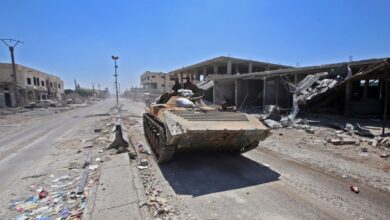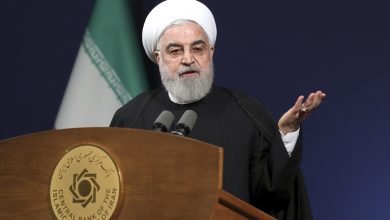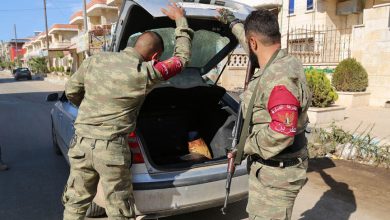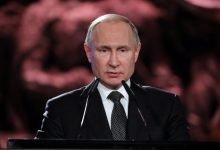
Iranian President Hassan Rouhani can be forgiven for feeling a twinge of envy as Russian President Vladimir Putin and Turkish President Recep Tayyip Erdogan met in Sochi to work out a deal for a buffer zone in northeastern Syria. Was his invitation lost in the mail?
Only a few years ago, the Iranian president would have been expected to preside over the negotiations, and sign off on the agreement. The Islamic Republic has been involved in every important discussion bearing on Syria, whether directly or as the elephant in the room, since the start of the civil war. That Putin and Erdogan didn’t require Rouhani’s presence in Sochi, or even his endorsement, says much about Iran’s reduced leverage in the country where it has shed much blood, and spent much treasure.
There are several reasons for this. U.S. sanctions have weakened Iran’s position in Syria: With its economy in free-fall and its people increasingly resentful of expensive foreign adventures, the regime in Tehran cannot match the resources Russia and Turkey can deploy in pursuit of their interests in the country. Iran’s regional ambitions have forced it to spread its reduced resources thin, from Yemen and the Persian Gulf to Iraq, Syria and Lebanon.
A more proximate cause for Iran’s reduced leverage may be the mass protests that have broken out in Syria’s neighborhood, leaving Tehran’s preferred proxies, Lebanon’s Hezbollah and Iraq’s Shiite militias, somewhat distracted.
Under the circumstances, Putin and Erdogan may have reckoned they could afford to take Iran for granted.
Of course, Iran enjoys cordial relations with both Russia and Turkey; in recent years, the three have bonded over a shared grievance against the U.S. In Syria, their interests have sometimes coincided. Iran and Russia back the dictator Bashar al-Assad; all three oppose a U.S. military presence on Syrian soil.
But they also compete over Damascus, each viewing Syria as part of its own sphere of influence. The Islamic Republic has older and deeper connections in Syria than Russia. The Shiite regime in Tehran is suspicious of Sunni Turkey’s designs.
And yet, Iran was able to voice only mild dissatisfaction over Erdogan’s invasion of Syria, offering to mediate between the Turks and Syrian Kurds. It has conducted an unannounced military drill along its borders with Turkey, an unsubtle reminder to Erdogan and Putin that they are not the only big guns in the field. But there’s no indication it will move forces into Syria, to expand its own footprint.
Instead the Iranians can only watch anxiously as Russia and Turkey capitalize on the reduced U.S. military presence in Syria to widen their own spheres of influence.
In other circumstances, the Putin-Erdogan deal would have given Iran an opportunity to strengthen its connections to Assad, at Russia’s expense. The sight of Moscow and Ankara carving up a chunk of Syrian soil is not likely to please the dictator of Damascus. On the eve of the meeting in Sochi, he described Erdogan as “a thief of territory.”
Assad’s response to the Turkish invasion has been to make a deal with the Kurds, offering clemency to those he viewed as his mortal enemies. He will encourage them to resist the Turks. But if he expects the backing of his patrons in Tehran, he’s in for disappointment. Iran has a surfeit of enemies, and can ill afford to antagonize the Turks and Russians.
Circumstances can change, as we’ve learned in Syria over the past few years. Erdogan’s ambitions could come unstuck for any number of reasons, from Kurdish resistance to another about-face by U.S. President Donald Trump. If the protests in Lebanon and Iraq die down, Iran’s proxies could again turn their attention to Syria, restoring some of Tehran’s lost leverage.
Rouhani can take some consolation from the hope that he will be a key figure in the next round of discussions. But for now, he’s a spectator, not a player.
Source: Bloomberg







